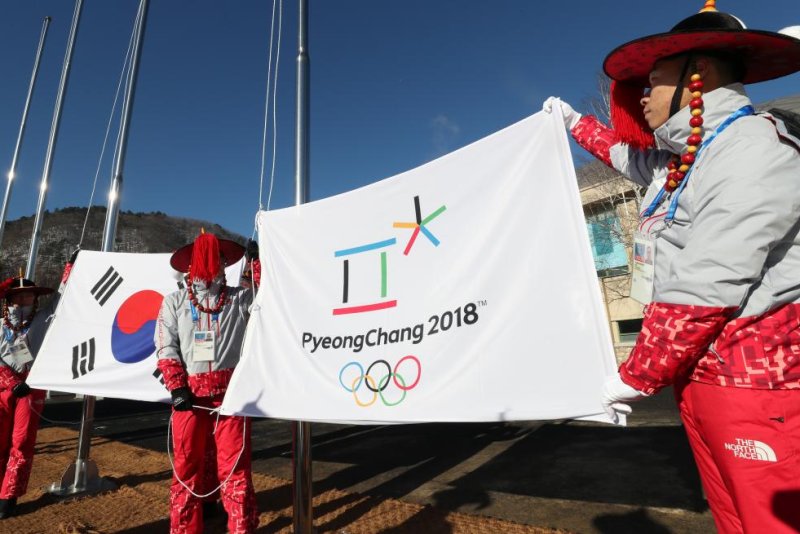Organizers of the Pyeongchang Olympics practice raising the national flag of South Korea and the Olympic flag at the athletes' village in Pyeongchang, Gangwon Province, on Feb. 1. Photo by Yonhap
CHUNCHEON, South Korea, Feb. 1 (UPI) -- U.S. policy against North Korea has not helped ease tensions on the peninsula and the 2018 Pyeongchang Winter Olympics is an opportunity for change, a South Korean sports historian said Thursday.
Gwang Ok, a professor of physical education at Chungbuk National University who has researched the impact of Japanese colonialism on sports development, told UPI that South Koreans are welcoming détente because other measures have only strained relations.
"I think South Koreans believe the current situation is being driven by the U.S. government, U.S. policy against North Korea," Ok said, adding escalation of tensions is "quite complicated."
Those policies date back to the days of President Barack Obama's administration, when Obama and his South Korean counterpart, former President Park Geun-hye, agreed on key issues, including the deployment of the U.S. missile defense system THAAD, a decision that brought strong opposition from China in the form of unofficial sanctions against South Korean companies.
It is also widely believed Park ordered the 2016 shutdown of a jointly operated factory park in North Korea, because Washington asked for "assistance," Ok said.
Following the Kaesong Industrial Complex suspension, North Korea continued to test weapons, and detonated its sixth nuclear device in September 2017.
The downward spiral continued until North Korea suggested taking part in the Winter Games, and South Korean President Moon Jae-in quickly agreed to move toward an Olympic-driven reconciliation, despite his continued opposition to nuclear weapons.
"President Moon in a way used this moment to relieve a bit of tension," Ok said, adding the use of Olympism to make harmonization is important.
The analyst also said there has been a shift in Pyongyang.
"North Korea, their policy and intention have changed," Ok said, referring to the long arc of Korean sports history.
North Korea's pledged participation in the Winter Games, and the early arrival of North Korean skiers and skaters to the Olympic site on Thursday, are all markers of progress, according to the South Korean analyst.
The latest moves are undoubtedly an improvement from past North Korean behavior, which included a bombing attack on a South Korean airliner in 1987, designed to disrupt the 1988 Seoul Olympics.
The North Koreans were "very jealous that South Korea could host a huge sports mega-event and renovate every corner of the country," according to the analyst, which is "exactly why they terrorized" a South Korean airliner.
The Seoul Olympics marked a watershed in the history of South Korea.
The event accelerated economic growth, democratization, and boosted South Koreans' confidence to move beyond their difficult past, marked by colonialism and war.
Ok, who studies Korea through the lens of sports history, says traditional Korean sports, like wrestling, were banned during Japan's 1910-45 occupation of the peninsula.
Japanese colonialists also regarded Koreans as racially inferior, and in response to discrimination, Koreans resisted official policy through excellence in athleticism, Ok said.
One of the more notable figures of the era is Sohn Kee-chung, a Korean runner who won gold in the marathon at the 1936 Berlin Olympics, and ran under the Japanese name Son Kitei, but refused to acknowledge the Japanese national anthem during the award ceremony.
"We Koreans suffered a lot because of Japanese colonization, and anti-Japanese sentiments were sometimes expressed through sporting events."
Ok said team sports fostered collectivism and nationalism among Koreans and built an "anti-Japanese" or anti-colonial spirit during occupation.
Events where a team of Korean football players was competing against a team of Japanese, and Japanese referees would ensure a Japanese victory regardless of a game's outcome, would only strengthen Korean resistance to discrimination.
Fights would spill out into the streets of Korean towns following an unfair ruling and Korean students would sing banned "patriotic, anti-Japanese songs" during rallies, touting future Korean independence and calling for a "fight to the death" for a Korean nation, and in the name of "Jesus Almighty."
In the run-up to the Olympics, North Korea propaganda recently called for ethnic solidarity based on a shared history and national identity.
But critics have said North Korea is pretending to be cooperative until the games are over.
Ok, who has coedited books The Triple Asian Olympics, and Japanese Imperialism: Politics and Sport in East Asia, disagrees.
"We can accelerate this story, we can expand, and we can communicate more and more," he said.
"I think we should develop this opportunity."















